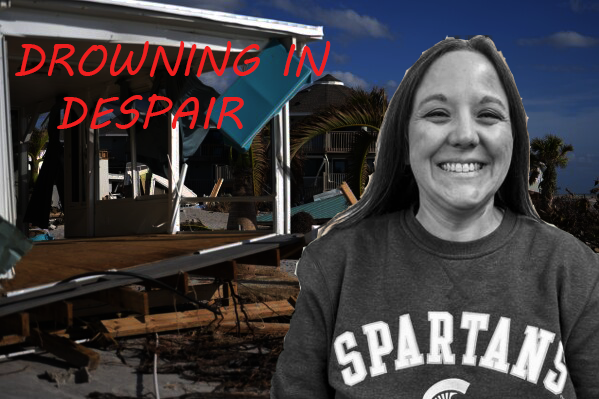If you have been keeping up with recent news, chances are you have heard about the hurricanes occurring in the south, specifically the Tampa Bay area. On September 26, 2024, a Category Four hurricane named Helene struck several southern states. Reaching wind speeds of 140 miles per hour and storm surges of 15 feet, the disaster caused hundreds of casualties and destroyed billions of dollars in property damages.

Although expected to hit the Big Bend area of Florida, the hurricane continued to spread to surrounding states, devastating Tennessee, Georgia, and South Carolina. According to a Defense Visual Information Distribution Service article posted a few days after the hurricane, residents living in the region where Helene initially made landfall, did not receive much of an evacuation notice. Due to this, once rumors spread about the more catastrophic Hurricane Milton being on its way, panic soared through Florida Locals.
This fear is seen in individuals like Michigan native and English Language Arts Teacher Rebecca Bortnichak, who shared her experience being in an area the hurricane was supposed to hit directly. Bortnichak was in Cancun, Mexico when Hurricane Helene hit the southern parts of North America. She recalls being worried but being quickly consoled by Mexican natives.
“They kept telling us that we were going to be fine and that this was no big deal,” said Bortnichak.
As this trip to Mexico was pre-planned and still intended to be taken after she heard about the storm, Bortnichak and her husband planned accordingly. Packing things like canned goods, card games, and other necessities, Bortnichak fully expected a major blowout and was shocked when the storm completely passed her resort.
“It was the most underwhelming thing ever,” said Bortnichak.
Bortnichak wraps up stating that she is grateful she did not let the weather influence the attendance of her vacation, and is grateful her worries did not end up transpiring into real life.
This terror did not stop at Florida residents though, frightening families worldwide who had family members living in the south.
These family members include individuals like English Language Arts Teacher Katie Christner, a Michigan resident who has a grandmother who resides in the south.
Although her grandmother has sheltered in place before during past hurricanes, the severity of the storm’s category frightened Christner. To ease these anxieties, her family decided to take some action to ensure they always knew their grandmother’s whereabouts during the storm.
“We had one person in our large, extended family call her and communicate with her during the whole hurricane,” said Christner.
Christner sheds some light on the situation as well, highlighting the reminders natural disasters force us to remember.
“You definitely take the time to call more, and touch base. A bunch of us live in different states; Grandma’s in Florida; I’m here in Michigan; I have family in Illinois; I have more family in Wisconsin, so we are all on the same group thread. We are all talking to her before and after the hurricane — you just feel a little closer when things like this happen,” said Christner.
Christner closes by mentioning the fact that her grandmother did not experience any immense damage to her property.
Following Hurricane Milton, many felt underwhelmed regarding the impact Milton had

on the affected areas. Publicized as a Category Five hurricane, the storm only ended up making landfall as a Category Two. Although thankful for the minimal damage that occurred, this angered residents and those who spent money evacuating a disaster they could have sheltered in place for.
This discontentment is expressed by Michigan local, Olivia Lounds, who experienced an immense amount of anxiety due to the severity of the alerts given by Florida representatives.
With Lounds having several family members and friends living in Florida, she took to applications like TikTok to get first-hand news about the hurricane and its path.
Lounds followed by expressing her opinion regarding the seriousness surrounding evacuating Florida before the storm, when it resulted in not being as bad as expected.
“If it [Hurricane Milton] ended up being a Category Five hurricane and people evacuated, then fine — everything would have been all good. Although in this situation, people have spent their money, ending up not needing to, and wasting their money,” said Lounds.
Instances like these led to people like Lounds being frustrated as prices of plane tickets and hotel rooms increased as evacuation alerts were released.
Natural disasters are unpredictable and are often immeasurable damage-wise until landfall is made. This lack of information leads many to panic and spread information that may not be completely factual. Although it is better to overestimate a catastrophe rather than underestimate one, government officials must issue statements that will inform the public and not cause global panic.
With trusted sources and improved communication, our world can better navigate natural hazards in a way that keeps people properly informed and safe.


